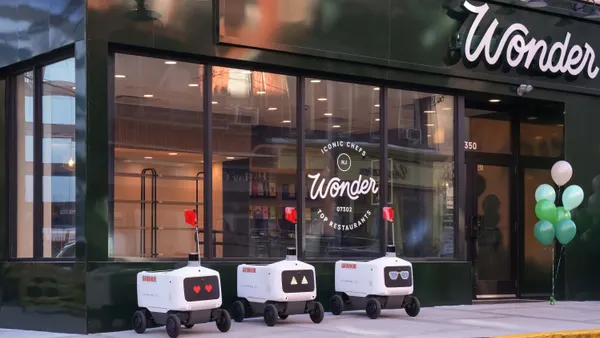Dive Brief:
- Uber will discontinue its Uber Eats operations in the Czech Republic, Egypt, Honduras, Romania, Saudi Arabia, Ukraine and Uruguay by June 4, according to an SEC filing. It will transfer its operations in the United Arab Emirates to Careem, a wholly-owned subsidiary that primarily operates in the Middle East.
- The company has been winding down operations in areas where it is not one of the top two delivery providers and focusing on its top markets instead.
- These markets make up 1% of Uber Eats’ gross bookings and 4% of Uber Eats’ adjusted EBITDA losses for the first quarter. The company will reinvest the savings in primary markets where it can get a better return on investment.
Dive Insight:
Uber Eats’ consolidation is no surprise as it has slowly left markets where it isn’t a dominant provider since 2018. In 2019, the company exited South Korea and sold its India business to Zomato. It left Southeast Asia in 2018.
This consolidation will be needed as the company continues to grapple with less than positive EBITDA, which was negative $461 million for 2019, despite growing revenue to $2.5 billion. Much of these losses were due to investments in key markets so moving investments to ones that are performing well could help boost earnings.
As the company began executing its strategy to focus on top markets, Uber Eats also had to contend with the unexpected resignation of its lead Jason Droege, who launched the division in 2015. He was replaced with Pierre-Dimitri Gore-Coty, Uber's vice president of international rides.
Uber Eats has gained ground among consumers and was the top app downloaded for food and grocery delivery worldwide for March and April, according to a report from AppAnnie emailed to Restaurant Dive. AppAnnie credited the company's initiatives that help local restaurants by removing customer delivery fees, adding daily payouts for faster cash flow and launching in-app integration to make direct contributions to restaurants as part of its global growth. The company also added grocery and convenience store delivery across the world as well.
With so many operators expanding their delivery markets during the last two months due to dine-in restrictions, Uber Eats has added more partnerships with chains, including Dunkin', Chick-fil-A and Chipotle. These deals could help it continue to grow its popularity among consumers, especially in the U.S. But profitability will continue to be top of the mind for the division, especially with analysts not expecting it to become profitable until 2024.











